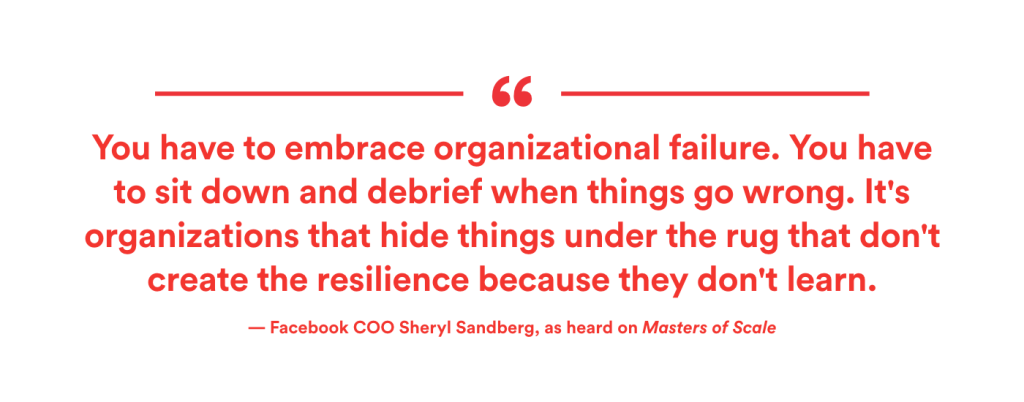Facebook COO Sheryl Sandberg talks leadership lessons with Reid Hoffman on the Masters of Scale podcast. Photo by Jacqui Ipp.
Leading a high-growth company and scaling it into a tech empire involves working through countless challenges: You need to constantly innovate, adapt with the economy, navigate relationships with executives, evolve your team, and more. Sheryl Sandberg knows this experience intimately, from her time as Google’s VP of global online sales and operations — during which she scaled the company’s online sales team from four to 4,000, driving two-thirds of the company’s revenue — through her past nine years as Facebook’s chief operating officer.
To get to where she — and Facebook — is today, Sandberg has learned hard leadership lessons about growing a team and a company.

In the fifth episode of Masters of Scale, the podcast hosted by famed entrepreneur Reid Hoffman, co-founder of LinkedIn and partner at the VC firm Greylock, Sandberg shares some of her most vital learnings from the tech world’s arduous trenches. The episode, “Lead, Lead Again,” which goes live tomorrow, May 31, also features exclusive insight from Bill Gates, Facebook founder Mark Zuckerberg, and more. Subscribe to Masters of Scale for access to the episode as soon as it’s released, and listen to a preview below
Read on for Sandberg’s three key lessons for managing a growing business, and get an insider’s look at her time at two of today’s most powerful companies.
1. Take risks to adapt your workforce to changing needs.
Businesses evolve at a rapid clip, especially in the tech industry — and a 10-person startup’s needs are drastically different from those at a company of 10, 100, or 1,000 times that size. Early in her business career, Sandberg learned that managing a startup means that promises you make are going to be broken, and plans will be changed. As Hoffman notes in the podcast, you can’t stop the onslaught of challenges, but you can identify the moment when they force you to pivot — and act accordingly.

“My team [at Google] was four people and they were very worried [how] we were going to grow,” Sandberg says. “So my first day I said, ‘Don’t worry. We’re all going to interview everyone.’ Two weeks later the team was 12 people and it was completely unreasonable to have a person interview with 12 people. So this promise I had made to make them feel good about scaling, I took away in a week.”
As a business grows, leaders face hard choices. Sometimes, they have to let go of staffers who were key to a startup’s early days but aren’t experienced enough to manage growing teams. Or, they must hire for roles that don’t exist yet, as Sandberg had to do when building her team at Google.
One solution that solves many ills is the strategic reskilling of employees to adapt to new priorities, which Facebook did in 2012. At that time, the company’s products were designed for desktop use, but people were transitioning to primarily mobile use faster than it could keep up with. Sandberg recalls:
“Mark [Zuckerberg] stood up at the company all-hands and said, ‘We’re going to be a mobile first company,’ and he did it incredibly well. But you know what happened the next day? Nothing. People still came in with their desktop screenshots because that’s what they knew how to build. So a couple of meetings in, Mark just said, ‘You know what? No more meetings unless you’re mobile screenshots first.’ Just by making that shift, he made the shift in the company. We really had to force it. The company really got on board but it meant retraining a lot of engineers.”
The entire organization’s shift to mobile involved a massive risk, from both a business and workforce perspective: pausing all new product features for an astonishing two years, and throwing engineers off the deep end into unknown territory. However, this willingness to adapt and confront limitations again where the industry was headed allowed for the change the company needed to get ahead.
2. Disagreements are a given — how you handle them is a choice.
When you’re joining a new company, it’s all but guaranteed that you won’t always see eye to eye with your future boss. But establishing a strategy for working through those inevitable disagreements will make your work more constructive, which benefits the whole business.
When Facebook founder Mark Zuckerberg was scouting Sandberg to potentially join the company, the two spent months speaking for several hours a week to determine whether she would be a good fit. “To say I had multiple conversations with Mark is kind of the understatement,” Sandberg says. “He was a late-night guy. He didn’t come into the office particularly early so he would come over for dinner at 8. I would literally have to kick him out at 11 or 12.”
During this time, Sandberg’s husband, the late Dave Goldberg, offered advice that still resonates with her today.
“Mark and I didn’t agree on a lot of substantive things at that point,” Sandberg recalls. “Dave told me, ‘Don’t work any of those out. You never will.’ He said, ‘What you want from Mark is process agreement on how you will work things out. Because even if you work all the questions you have out now, they’re going to change.’”
Sandberg and Zuckerberg agreed to schedule twice-weekly meetings to give each other honest feedback and work through their disagreements, which they’ve now been doing for nine years. A company’s goals, priorities, and challenges are constantly changing, but one thing you can keep consistent is your approach to finding a solution.
3. Promote a culture of constant feedback at all levels of the business.
As Hoffman notes in the Masters of Scale episode, the best managers don’t spot changes on their own — their team surfaces problems up to them. The challenge, Sandberg has learned, is getting them to speak up.
When Sandberg was building her team at Google, she realized she had been holding up the hiring process — and her reports already knew that, but didn’t tell her. “I thought to myself, ‘I’ve become a bottleneck and you didn’t tell me, and that’s on me,’” she says. “I realized I had to make it safe to speak up when I’m messing up.”

She faced a similar issue at Facebook, when her request of “No PowerPoint in my meetings” was misunderstood as “No PowerPoint in any meetings, ever.” To straighten it out, “I got on the stage [at Facebook’s global sales conferences] and said, ‘One, I’m sorry, I didn’t mean that. Two, it is on me that if you all thought that was a stupid idea, you need to speak up and tell me. Of course you have PowerPoint with clients. Clients love PowerPoint. I don’t,’” she says. “It was just a really good lesson that I needed to be super careful that things didn’t get taken too far, but also that I needed to make sure people could speak up.”
Sandberg champions openness, and being resilient through embracing and learning from failure. “You have to build in a culture where, when I think you need to do something better or you think I need to do something better, we tell each other and tell each other directly and work it out,” she says. “You have to embrace organizational failure. You have to sit down and debrief when things go wrong. Why did they go wrong? What can we learn and what can we do better? It’s organizations that hide things under the rug that don’t create the resilience because they don’t learn.”
For more inspiring insight from Sandberg — with cameos from Bill Gates, Mark Zuckerberg, and more — subscribe to Masters of Scale and listen to the full episode when it goes live tomorrow.
***
At General Assembly, get help scaling your business through innovative, career-building courses in web development, design, data, marketing, and business — online and at campuses across the globe. Assess job candidates and your employees’ skills through GA’s Credentials division, and find out how you can invest in your employees’ skills and growth through our corporate training programs.